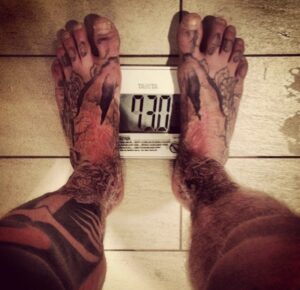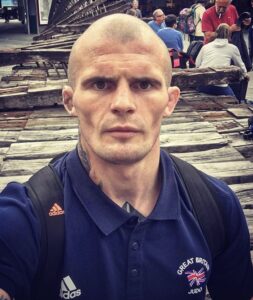
The idea for the topic of this week’s blog was sparked by a post on the Facebook forum GB Judo Underground. A video of an MMA fighter, cutting 5kg in 48 hours, was uploaded and the comment, made by the person that posted it, was talking about how “doing this was unacceptable…..It shouldn’t happen….a bad thing for young impressionable players to see.”
Although I disagreed with a lot of what was said on the posts comments, I still think that it is good to see people openly discussing weight making, something that has largely been an unknown area for people outside of the competitive circles. Particularly in the Judo community, it seems to have become a taboo subject that people don’t really want to talk about, which is completely understandable considering there have been a number of well known legal prosecutions against coaches over the past couple of decades because of it. If, as a community, we want to address it and protect, particularly younger players, then we shouldn’t avoid discussing it.
With the social media culture that we all now live in, weight cutting is, as I’m sure we are all aware, something that young people interested or partaking in combat sports will be exposed to. They are going to see it. I follow both boxing and MMA and weight loss is discussed all the time in documentaries, the build up to fights, at press conferences and, by the commentators during events. The bloody weigh ins themselves are televised! MMA is consistently growing in popularity, which I think is brilliant, and, of all the combat sports is the one in which weight cutting is the most documented, most openly discussed. The weight making culture in MMA owes a lot of its heritage to the long standing American College Wrestling system, where in some cases, athletes are wrestling for scholarships, for a better future. They will take any advantage that they can. Many of the weight making methods employed in MMA were used much earlier in wrestling, and in Judo. It is worth mentioning that, of course, in other weight controlled sports like boxing, weight making has always occurred however, the culture of heavily dehydrating in the final 24 hours or so to make weight is much more prevalent in the grappling sports. Sports science has known for a long time that dehydration removes fluid protecting the brain, which takes far longer to replenish than the muscles and, becomes MUCH more dangerous particularly if the main aim of the sport is to strike the opponent in the head. Judo, until recent years, always had morning weigh ins, 2 hours before the event. Wrestling has mainly been the day before, offering more time to replenish the body.

I think that it is important to remember though, when we discuss these things, who it is that we are watching online. The people on those documentaries are high level competitive athletes. What do high level athletes do? They grasp any advantage that they can, look for any inch of gain on their opposition that they can get. There is, a point (and that point is unique to each person) where cutting weight can leave an individual with a clear physical advantage; that has been known since the very beginning of weight controlled sport. I think that it has to be accepted that while the sports are weight controlled that weight cutting will ALWAYS occur. To think otherwise is absolute naivety of how the mind of a high level competitive athlete works. Athletes and coaches will always search for advantages, always. It’s a big part of their jobs.
Yes, there is a point, after the point previously mentioned, that cutting weight can become detrimental to performance and to mental health. My own personal experience was that, with the benefit of hindsight, I stuck at a weight category for 3 years too long, it was a horrible and corrosive place to be. I always had to work hard to get to 73kg, and it got slowly but consistently harder however, for a long time, I could refuel and fight near my best, that was the case until 2016. After then I enjoyed my experience in Judo less and less and, although still training full time and fighting regularly, I got no where near the results I aspired to. My whole existence felt like it circulated around the scales. I lost all control of my eating for periods of time after tournaments and weigh ins. The more I tried to control it or told myself I needed more willpower the worse it got. I couldn’t see that it wasn’t a lack of willpower, I pushed my self immensely, I was just blind to the madness of continuing to do the same things but expecting different results.

Yes, I SHOULD have moved up at the end of the Rio 2016 Olympic Cycle and, again with the luxury of hindsight, I possibly COULD have moved up after London 2012. My coach tried to tell me to try the higher wight after the Rio cycle but did I listen? Well for a couple of months I did, then made the decision to begin dropping back down again. For me, and a lot of the other athletes I’ve known and been around, we train full time, live on little money, have dreamt of winning high level tournaments for decades, slog our guts out year in and year out, we make all the sacrifices and try to grasp any advantages that we can. It’s easy to look at it from the outside and look in and say “they should just move up.” That is just like saying to a heroin addict that they should “just” give up heroin, like asking an obese person to “just” stop eating so much. The complexity and volume of that decision has so many areas of that persons life wrapped up in it. I remember a club level coach, who has nothing to do with me, telling me, after a particularly nasty cut for the 2018 British Championships, that I looked horrendous and needed to move up. It was ten minutes to weigh in, I was on weight, my kidneys were pounding from the dehydration and I felt an inch from death, if I’d have had the strength I think that I would have told him where to go. Where was this podgy bastard all year while I’d lived those past 12 months (British Champs is in December) on restricted calories, obsessed about weigh in dates and, battled the continual pulsating compulsion to eat. Cheeky twat I thought! Again, now I’m out of making -73kg and my relationship with it has ended, I can rationally see that what he said probably came from a place of kindness and, was, ultimately right, I should have moved up. It becomes a massively personal thing though and although the statement he said was true, he had no right to say it to me. He isn’t my coach nor anywhere near the level of my personal coach. For context, I was lying in the warm up room on my own waiting for the weigh in and he just bowled over to me and said it. A poor decision for a coach to have made.

I believe that when it comes to the improving information around making weight that our youngsters are first educated on the difference between rulesets and regulations in the different weight controlled sports. MMA for example normally has 24-36 hours between the weigh in and time of competition. Professional Boxing, something similar. MMA fighters compete 2-5 times year. A Judo player weighs in 12 hours before, the night before with the tournament starting the following morning. A typical international level Judo player competes 8-12 times per year. Judo also has the 5 percent rule to bear in mind; one hour before the start of the tournament 4 athletes in each category are randomly weight checked and, if they are more than 5 percent over the weight, they are disqualified. For example, if fighting at -73kg, were I checked and was more than 76.7kg then I would be DQ’ed. This was put in place to try to discouraged big cuts and big bounces after weigh ins. In theory it looks good but I am sceptical, people just continue to restrict after the first weigh in. Jiu-jitsu, although professional and amateur differ, weigh in not long before they step out to their first contest. I’m unsure how often international BJJ players compete but I’d predict their year looks more similar to a Judo players schedule. That is a MASSIVE difference between the sports. Remember, with the professional combat sports, missing weight doesn’t always mean that you don’t compete, it often means that that individual losses a percentage of money from their purse. With the amateur sport tournament format it’s far simpler, don’t make weight then you don’t fight. I believe all of the sports can learn from each other but I think that the first area that we should educate the younger athletes in is the massive differences in the regulations around weigh ins between the sports, and how this can determine the differences in weight making. They are going to see it online, they need to know.
Now let’s look at the actual categories themselves. For senior Judo there are seven mens and seven women categories, from the lightest division the jump to the next category increases by roughly 10 percent each time. That, in actuality, is an extremely large gap. MMA employs a similar process which baffles me, surely, as a professional, prize fighting sport it would be a benefit to have more categories and titles, for the athletes and for promotion purposes. Professional boxing does this well, many weight groups being as little as 2-3.5kgs apart. As a senior Judo player it makes absolute sense, if only a smaller percentage over, to drop down to the lower weight. Anyone in objection of that need only go to an international training camp, search out a couple of Russian or Georgian fighters at the higher weight (who themselves cut) and see how you get on. Obviously the point of beneficial cutting is individual, after that point, as said before, it becomes detrimental. A recent study of international level Judo players claimed that a 5-7% of total body mass cut was normal for high level fighters, I know of some doing slightly more than that and still fighting very well, but again, only very slightly more. That study didn’t differentiate between the sexes; it’s well documented that men and women can hold and release water differently. I also believe this is where the 5 percent bracket in Judo is too low; as the mentioned study shows, most athletes sit between 5-7 percent over the limit, to allow them to replenish completely is to take them back to that 5 percent mark, then bear in mind that weigh in is at the end of the day and they won’t have consumed much over that day, a lot wake up on the day of competition back at their natural weight, 5 percent over. I’d like to see this limit extended to 7 percent to allow most competitors to eat a decent breakfast and have a litre or so of water without that added stress of worrying heavily about the weight check. You still see a lot of fighters in their sweat kits the next morning getting ready to drop back down to that 5 percent mark if checked, for a few years me included! Obviously, as also previously mentioned, MMA fighters may cut more but they have far longer to replenish before competing and have to weigh in far less than Judo players.

Once the fact has been faced that, as aspiring international seniors, we will very likely have to cut some weight regularly at a certain stage then we can look at the best and healthiest methods of doing so. Consulting a professional is extremely recommended. Ensure that it is someone that has experience with weight controlled sport. I’ve been aware of a few that have worked in the Judo circles that hadn’t and they were useless in the area of weight making. Do some good research. I found a lot of the methods used in MMA really interesting and useful. To the inexperienced person 2-3kg loss seems huge but, for example (I’m not suggesting anyone tries it), most people could do that in a few days simply by eating clean foods and removing as much sodium and fibre from the diet as possible which promotes a flushing of the bowels. There are many tricks and methods to drop weight quickly. Personally, I and many other athletes would rather, if only a couple of kilograms over, use one of these more scientific style drops over the case of a few hours than live on a strict diet for a couple of weeks. Sometimes both methods are required but, again, part of the job. It doesn’t take long to learn that the weight shown on the scales can be manipulated, to a degree, fairly simply and quickly. When it has a detrimental affect on performance then it’s time to reevaluate. On that note though it is worth considering the idea that it is not about how you FEEL, but how you COMPARE. Of course you’re not going to feel the same at, say 60kg, like when you were 63kg. You’re not going to feel great while you are cutting (does anyone enjoy dieting?) or at the weigh in but, it only matters how you compare to the opposition when actually stepping out to compete. Obviously if you’re cutting weight regularly and life becomes a total misery then again, time to reevaluate. Not many people ‘move up’ at the perfect time, sometimes you just gotta work that out on the way. Also, regarding ranking systems (I’m going to use the 2 year Olympic qualification process as an example), any points collected are only valid at the weight they were gained, move up and we have to start from scratch, that (a shot at the Olympic Games) often keeps athletes down at a weight a little longer. Part of the job. It’s worth mentioning also that altering the diet at all to hit the desired weight category is still weight cutting, even something as small as removing sugary junk food for a couple of days is still altering ones relationship and consumption of food in which to make weight. It’s still part of the same family even if it isn’t sitting in hot baths or saunas for hours.
Regards to long term affects and health, there is no doubt that repeated calorie deficiency and dehydration can have negative physical side affects. At a point though, if it’s not so severe, and leads to improved performance, I often ask myself (myself who is not a health professional) how is it any less healthy than someone that sticks 10 pints into them and eats a doner kebab on a Friday night, that has clearly proven negative physical affects! I’m fairly sure alcohol dehydrates the body. Not that I have a problem with either, personally I believe an adult should be able to do whatever they want with their own body, as long as it doesn’t negatively impact another. If a full time athlete’s primary concern was health then they wouldn’t be a full time athlete, they push their minds and bodies far beyond what the average civilian does. Yes, they should aim to do it as healthily (physically and mentally) as possible but, virtually all competitive athletes that I know would opt to do something “slightly unhealthy” for an advantage; whether that’s training 3 times a day or losing some weight etc. There may have to be a point where a senior athlete says “no more” regards to certain weight categories but that is individual between them and their coach but, the athlete should know that it is ultimately their own decision.

There is a growing amount of supporting evidence that is documenting the psychological affects of weight cutting, which I think is excellent. No doubt weight loss CAN be very detrimental long term to a persons mind. That is a no brainer. Restrict food and water from an individual and it doesn’t take a rocket scientist to work out that that could lead to a disordered relationship with food consumption. I think that that often how severe it affects someone is a very personal and individual thing. I’m certainly no psychologist but I believe that it is very complex and multidimensional, with personality, genetics and, personal history/experiences all wrapped up in it. Weight cutting affects people differently; I’ve seen and talked to people that cut a small amount only a couple of times and that, from that, desperation around food has lived with them for decades. I’ve also known people that have cut a lot, regularly over many years that seem to have a healthy relationship with food. Not that body shape is always a clear sign, it’s mainly what goes on between the ears (which obviously can massively determine body shape); as Jenni Schaefer says in her powerful Life Without ED (ED- Eating Disorder) the worst thing that you can say to someone with an eating disorder is “you don’t look like you have an eating disorder.” It’s what goes on in the mind before what does, or doesn’t, go into the mouth.
Personally, I employed professionals to help aid me with my mind and nutrition throughout a lot of my senior career. As I previously mentioned I, over the last few years struggled more and more with weight and food (my own choosing to stay at -73kg) and, I do have an obsessive/desperate streak to my personality. I’ve also seen so many people struggle post Judo career with their weight and relationship with food, I decided I didn’t want to continue like that. Seeking help and following professionals advice, since closing the door on -73kg, although sometimes difficult, has been working very well for me over the past 12 months. I couldn’t recommend it enough for anyone that may think that they are in a similar boat.
So back to our young, impressionable athletes. I’ve long time thought, and done over the past few years, that I would always discourage any weight loss with the kids that I coach. I currently head up the -12 years section at Camberley Judo Club. Obviously the parents talk to me about it, the kids still get weighed at tournaments, but I’ve found that no one has a problem with me making the point that, with no exceptions, players will just compete at whatever bracket their natural weigh leaves them in. As a community a lot of good work has been done already with regards to kids making weight, or more specifically, not making weight over the past 10-15 years. I also think that it’s great to see world class athletes like Nekoda Davis delivering talks on her weight cutting experiences for club coaches. I made weight through all the weight categories as a kid and, in the long term, I think it made no difference at all to my long term career. I was always going to stay in the sport. I never cut weight severely, as some did, but now, looking back I don’t see that there was much point in any of it. Even the small amount of stress it brought as a kid wasn’t worth it. I don’t know one person that regularly made weight hard, as kids or cadets, that made it into the senior ranks, no matter how good their results were then. Not one. And, for me, getting the kids right through into seniors, should they wish to pursue a career in Judo, means much more to me than any kids, cadet or junior results. Don’t get me wrong, I LOVE it when the kids win but, in regards to long term, the fact must be faced that nearly all of them will finish before they make the senior ranks, no matter how good they are. I see my main aim in making the training fun and installing good basics so that the handful that stay on will have a strong base. No one remembers a cadet or junior medallist. Making them cut, putting too much pressure on them or making it too hard early on ALWAYS leads to the same place, them eventually walking away from the sport. I’ve not see one exception to that rule. It is though, a fine line to walk sometimes, particularly with those ones that are keen to compete; keeping them engaged and hungry enough but not having them do too much, or anything silly like losing weight at a young age. Letting them know that you do care about how they get on in competition but that you care more about them staying in it for the long run for me is key; something easier for us to be able to do at Camberley as the kids and parents can clearly observe the full time set up, that we offer a pathway all the way up to Olympic level.

Kids will always want to win and largely aren’t bothered by much else, that’s just how they are. That’s how I was. It is good to see, and learn from, some of the long standing club coaches on the kids tournament circuit and how they manage their young players. These ideas have been being put into place with younger Judoka for a good while now. It does get trickier with cadets (-17 years) and especially juniors (-21 years). A 20 year old is still a junior but is also very much a young adult. I think that a good coach doesn’t make a robot out of someone but teaches and enables them to make their own decisions. An imaginary scenario I ask myself is, say, a 20 year old junior is selected to fight at the Junior World Championships, which they will have had to have worked very hard for but, is a small amount of weight over, let’s say 1kg for arguments sake, and comes to me for help. They say that they are going to make the weight and what advice can I give them. What do I do there? I can say “don’t make it” but if I know that they are going to try even if I say don’t, where does my responsibility lie? Do I say nothing to completely protect myself or do I help and support that person? What is the best, reasonable and responsible decision for the athlete? It’s messy. The lines always seem blurred. Part of me thinks that I should avoid all talk about it to keep myself covered, but then I also think that to do that is me acting irresponsibly, not being open, honest and supportive towards that athlete. To conclude I don’t have the answer for a situation like that, I’m open to suggestions.
It’s always easy to look in at the weight controlled sports from the outside and comment but, the harsh reality is if someone hasn’t been through the mill they probably never will fully understand it. If someone is very anti weight loss then, a high level competitive career in a weight controlled sport probably isn’t going to be for them.
I think the first port of call should be a rational acceptance that while the sports are weight controlled that weight cutting shall always take place. From that point of acceptance we can then look to how we can support the athletes as best as possible.
Sign up to my free weekly newsletter The Grappler’s Weekly Weigh In by clicking here

